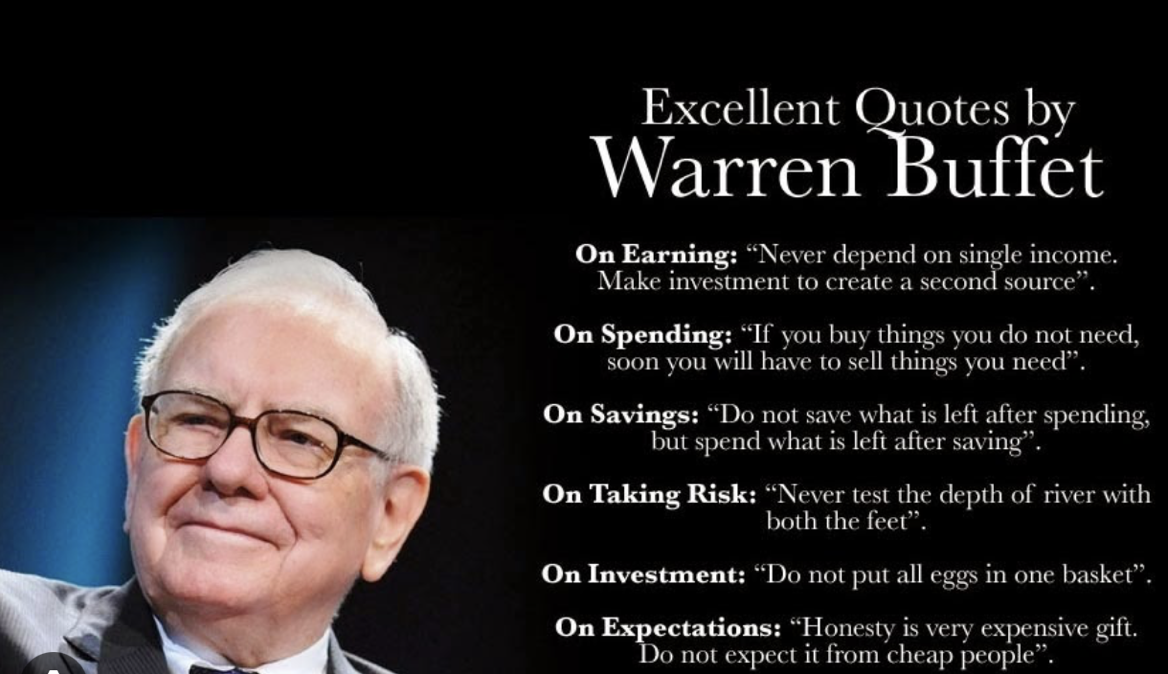
(SENSIBLE INVESTING TIPS BY BUFFETT TO START THE NEW YEAR)
January 10, 2024
Hello everyone,
I want to sink into your psyche today some investing advice by Buffett. You would do well to write these on a piece of paper and stick that on the wall above your computer or your desk and read it every day.
We might know the hard and fast rules of investing, but life has a habit of tipping the scales sometimes, where we temporarily lose our balance and are not thinking clearly, and these are the times we sometimes slip up in our ability to stick to the plan and the rules.
So, let’s jump into those tips.
1. Design a broad portfolio. The goal of the non-professional investor is not to pick winners – but rather own a cross-section of businesses that in the aggregate are bound to do well. This is why Buffett always advises investors to invest in a low-cost S&P 500 index fund, which will achieve this goal. He suggests checking out Vanguard. Interestingly, Buffett revealed 10 years ago that he would direct 10% of the cash to go into short-term government bonds and 90% to a low-cost, S&P500 index fund.
2. Steer clear of the financial salesperson. Professional money managers and advisors (on Wall Street or indeed anywhere) are incentivized to recommend various securities. The fact is that they rarely beat the market. Buffett’s words here: “You just have to recognize you’re dealing with an industry where it pays to be a great salesperson…There’s a lot more money in selling than in managing…if you look to the essence of investment management.” (I learned this lesson the hard way and am now very wary). And please note, that more than 95% of financial newsletters are rubbish, written by people with no investing experience.
3. You don’t need to be a Math genius. Buffett says you don’t need to excel at technical analysis or mathematical calculations to find great stocks. Buffett comments that “if you need to use a computer or a calculator to make the calculation, you shouldn’t buy it” (the stock).
4. When you buy a stock, you own part of the business. Buffett only buys something when he grasps the intrinsic value of an asset, or the discounted value today of the cash that a business generates in the future.
5. Market action is largely driven by emotions. Fear and greed should guide investors on when to buy and sell. Buy when there is fear and sell when there is greed. Simple as that. (For long-term investors, just average in and stick the investment in the bottom compartment of your cupboard). Buffett reminds us of the fact that math and a high IQ don’t necessarily help. So, leave the ego boxed up if you topped your class in Math – it may get in the way here... Buffett’s words: “Higher mathematics may be dangerous, and it will lead you down pathways that are better left untrod.” He goes on to remind us that “we do not sit with spreadsheets…we just see something that obviously is better than anything else around, that we understand. And then we act.”
6. After a loss, move on. Look forward. No extra detail is needed here.
7. Steer clear of declining businesses. When Buffett started on his investing journey, he used to buy cheap, failing businesses that he called “cigar butts.” But that strategy is not beneficial in the long run. Real money is going to be made by being in growing businesses, and that’s where the focus should be. Buffett is now known for seeking out wonderful businesses that he could buy at fair prices. He transformed Berkshire Hathaway from a small, failing textile mill into a near-$800 billion multifaceted juggernaut.
The Marina in Mackay
My son, Alex, at the Mackay Marina
Cheers,
Jacquie





